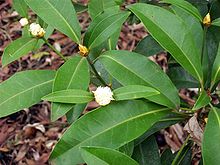Baloghia is a genus of plants under the family Euphorbiaceae first described as a genus in 1833.[2][4] It is native to Australia (Queensland, New South Wales, Lord Howe I., Norfolk Island), New Caledonia, and Vanuatu.[3][5][6] Cocconerion is a close relative.[7]
| Baloghia | |
|---|---|

| |
| Baloghia marmorata | |
| Scientific classification | |
| Kingdom: | Plantae |
| Clade: | Tracheophytes |
| Clade: | Angiosperms |
| Clade: | Eudicots |
| Clade: | Rosids |
| Order: | Malpighiales |
| Family: | Euphorbiaceae |
| Subfamily: | Crotonoideae |
| Tribe: | Codiaeae |
| Genus: | Baloghia Endl.[1] |
| Type species | |
| Baloghia lucida[2] | |
| Synonyms[3] | |
|
Steigeria Müll.Arg. | |
- Species[3]
- Baloghia alternifolia - New Caledonia
- Baloghia anisomera - New Caledonia
- Baloghia balansae - New Caledonia
- Baloghia brongniartii - New Caledonia
- Baloghia buchholzii - New Caledonia
- Baloghia bureavii - New Caledonia
- Baloghia deplanchei - New Caledonia
- Baloghia drimiflora - New Caledonia
- Baloghia inophylla - Queensland, New South Wales, Norfolk I., Lord Howe I., New Caledonia, Loyalty Is.
- Baloghia marmorata - Queensland, New South Wales
- Baloghia montana - New Caledonia, Vanuatu
- Baloghia neocaledonica - New Caledonia
- Baloghia parviflora - Atherton Tableland
- Baloghia pininsularis - Îsle des Pins SE of New Caledonia
- Baloghia pulchella - Mt. Dzumac in New Caledonia
- Formerly included
moved to Austrobuxus Fontainea Scagea
- B. carunculata - Austrobuxus carunculatus
- B. oligostemon - Scagea oligostemon
- B. pancheri - Fontainea pancheri
References
editWikimedia Commons has media related to Baloghia.
- ^ "Baloghia". Australian Plant Name Index (APNI), IBIS database. Centre for Plant Biodiversity Research, Australian Government, Canberra. Retrieved 27 July 2013.
- ^ a b Tropicos, Baloghia Endl.
- ^ a b c Kew World Checklist of Selected Plant Families
- ^ Endlicher, Stephan Friedrich Ladislaus. 1833. Prodromus Florae Norfolkicae 84-85 in Latin
- ^ James, T.A.; Harden, G.J. "Genus Baloghia". PlantNET - New South Wales Flora Online. Royal Botanic Gardens & Domain Trust, Sydney Australia. Retrieved 27 July 2013.
- ^ Govaerts, R., Frodin, D.G. & Radcliffe-Smith, A. (2000). World Checklist and Bibliography of Euphorbiaceae (and Pandaceae) 1-4: 1-1622. The Board of Trustees of the Royal Botanic Gardens, Kew.
- ^ Tokuoka, T. (2007) Molecular Phylogenetic Analysis of Euphorbiaceae Sensu Stricto Based on Plastid and Nuclear DNA Sequences and Ovule and Seed Character Evolution.” Journal of Plant Research 120 (4): 511–22.